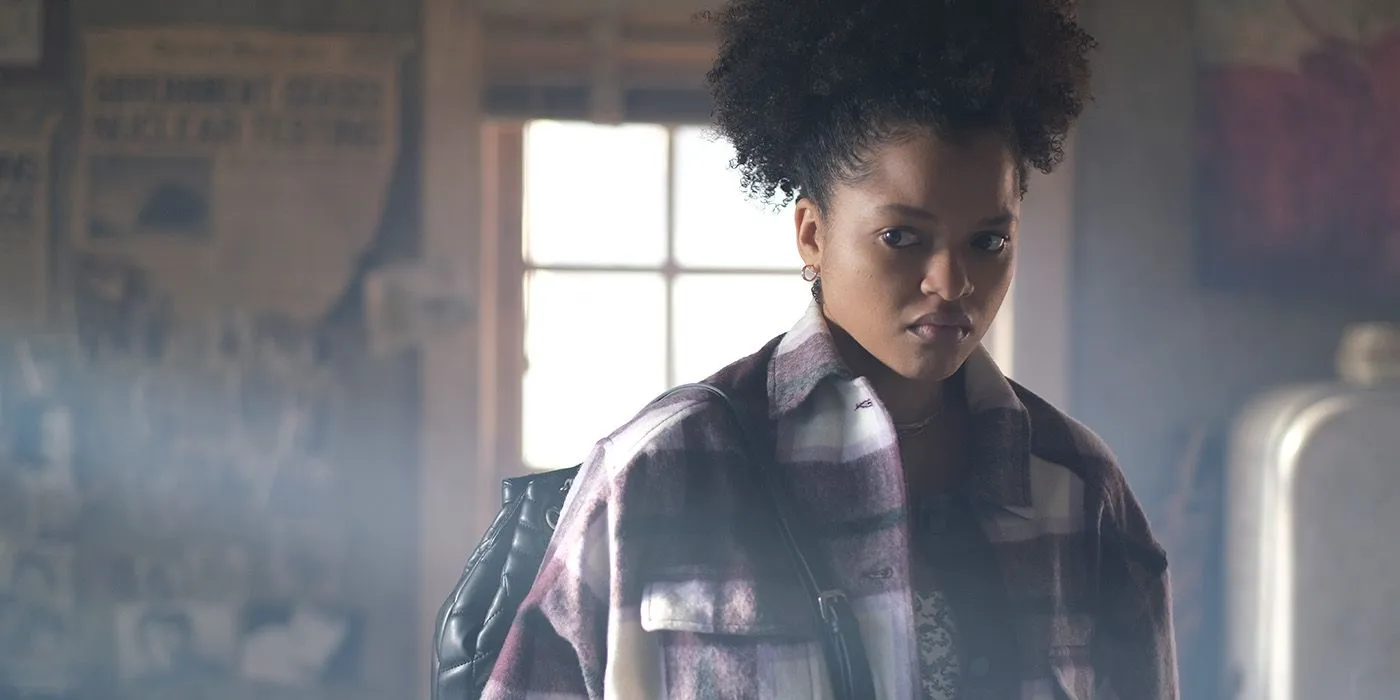One night in LA, strange lights steal Tatiana away from her poolside, plucking the woman from her world in the blink of an eye. Her lover, Alex, is left devastated by the unexplained abduction. But he refuses to give up searching for answers. Along with friends Patricia, Delilah, and UFO enthusiast George, Alex embarks on a quest that will test the bounds of belief. Their journey takes them to strange desert spots and secret underground bunkers as they try to piece together a devastating mystery.
Yet this intergalactic manhunt is plagued with puzzles of its own. Lumina’s direction is as perplexing as the case it lays out. Absurd scenes are spliced together with jarring edits, like fragments from the fever dreams of an AI gone rogue. The CGI couldn’t outrun a drunk sloth. And plot holes you could fly a spaceship through are left agape. And just when it seems things couldn’t get any weirder, Eric Roberts swoops in with scenery-shredding gusto, only vanishing as suddenly as he arrived.
But, as nonsensical as this cinematic experience gets, it’s never dull. For better or worse, Lumina pulls you to places no film has gone before, leaving you in a constant state of bewildered amusement. So buckle up and surrender logic at the door. You won’t find answers here, only more outrageous questions. It’s an alien adventure like no other—one that will burrow deep in your brain for reasons you may never understand. Strap in for the bizarre ride that is Lumina!
Flat Characters in the Final Frontier
One thing LUMINA spends a lot of time on is introducing its main characters. Yet for all the scenes establishing their origins and relationships, you never truly get a sense of who these people really are.
Take Alex, the grieving boyfriend spearheading the search. We learn he’s distraught over losing Tatiana. But what’s his personality like outside of that? His hopes, fears, and sense of humor? You never get under the surface. Likewise with Patricia, who films ominous conversations. But why? What drives her? Beyond vaping, her character remains a total enigma.
The women fare even worse. All we knew about Tatiana before her abduction was that she’s beautiful. She exists solely to be the damsel fueling Alex’s mission. And once taken, she’s reduced to a distant MacGuffin with no inner life of her own.
Then there’s Delilah, whose sole trait appears to be pining after her ex. She’s presented as a potential source of drama, but her actions feel arbitrarily generated rather than authentically motivated. When she temporarily joins the rescue, there’s no depth to justify why.
Which leaves George, meant as comic relief. But his attempts at humor through awkward sexism only highlight Lumina’s one-dimensional approach. Watching him openly leer at the women, you wish he’d develop a character beyond silly comments and conspiracies.
With so much setup invested in these archetypes, it’s disappointing to find such vacant personalities beneath the surface. Viewers are left wanting richer backstories, inner conflicts, unique quirks—anything that could develop these flat characters beyond basic stereotypes. When the plot tosses them into peril, there’s no emotional incentive to care what happens next. All the time spent on character introductions proves largely wasted without authentic souls populating this bizarre story. In chasing its interstellar macguffins, Lumina neglects the humanity that could have made its vision truly sing.
Muddled Narrative in the Final Frontier
Lumina takes its time before the real story starts. Now, a slow burn can be fine if it lays good groundwork. But this intro spends so long on a mundane relationship drama that feels tangential to the premise. By the time aliens enter the picture, you’ve almost forgotten this was billed as an abduction flick.
And that opening scene? Sure, an intriguing tease about someone finding a crashed vehicle. But then we get yanked straight to a house party with no context. It’s so jarring you feel lost, like turning on a sequel by mistake.
Once the plot kicks in, it’s a messy jumble. Scenes barely connect as our hapless heroes flail between conspiracy clues. One moment they’re investigating missing files, and next they’re fleeing military goons amid fake gunfire. It’s a tonal whiplash that undermines any momentum.
Pacing is another issue. Where some films take suspenseful pauses, Lumina stretches even minor moments to an agonizing degree. Watching these characters emote is torture when the script holds such potential thrills. You find yourself scrolling on your phone, disengaged from whatever’s happening.
Then there are the blunt edits. A conversation abruptly ends mid-sentence as we cut elsewhere. Plot points emerge without introduction, as if big reveals were on the cutting room floor. It leaves the story a jagged, piecemeal thing with chunks missing.
Worse are the genres Lumina tries to stuff in. It wants to be sci-fi, conspiracy flick, bromantic comedy, and more, but it spreads itself too thin to succeed at any one. The result is a mishmash that never feels cohesive. A laser gun showdown plays for yuks, then switches to ominous vibes with no transition.
You can see that McKoy aimed for creativity. But with no tight narrative focus, his ambitious concepts instead come off as incoherent. Fun ideas are there, just not developed into a whole story. Like its heroes, the film ends lost, spinning its wheels in a sci-fi saga and never figuring out how to drive. A tighter edit could’ve focused this promising premise into a campy cult classic. As is, it’s too jumbled a ride to recommend with conviction.
Uneven Visuals Sink Promising Concept
Now I’ll be the first to cut some slack for low-budget indie flicks—working with limited means is tough. But Lumina drops the ball on delivering its intriguing ideas through shoddy effects that undermine tension.
You can see potential in the opening—alien worlds set the stage nicely. And there are some unsettling body horror scenes involving cloning tubes. But these strengths make later failings harder to forgive.
When Tatiana vanishes, the CGI-blinding flash looks like a PlayStation cutscene. And characters interacting with invisible aliens pull you right out of the story. Suspense dies watching heroes flail at green screens.
Even simple stuff falters. Establishing pans across landscapes just jerk between static shots. Edits abruptly as a glitchy YouTube video. At times, it seems pickups were hurriedly tacked on versus integral to the original vision.
As our questers explore more locations, environments feel lifeless as props. Underground labs lack a sense of scale or danger. Tactical shootouts play for laughs, minus the impact of phony gunfire FX.
Action sequences ought to provide thrills but quickly tire. Characters leap dimensions like a screen-tear, never knowing where their opponents are. The climactic showdown resembles a school play with toy phasers.
Creature work also ranges from decent haunted mask makeup to laughable guys in rubber suits. A money shot teasing creepy aliens gets dark silhouettes—we never get a clear look!
It’s too bad, as the finale depicts an epic-scale battle that could have been memorably terrifying. But shoddy means undermine an ending primed to deliver. With stronger technical execution, Lumina might have molded its promising ingredients into a cult gem. As is, visual flaws undermine a narrative with vision but lacking vision.
Uncovering Murky Plots
This movie tosses around some intriguing concepts. Lumina hints at shadowy forces hiding the truth about aliens. Scenes depicting underground labs raise eyebrows over what kind of experiments go on there.
Early on, it seems like a haunting tale of lost love with a sci-fi twist. But the focus shifts more to unraveling enigmas. Our explorers dig for clues, convinced that secrets lie buried. They’re right that something strange goes on, even if what exactly stays unclear.
Visits to a reclusive expert, and Tatiana’s folks lift the lid ever so slightly. We pick up tantalizing pieces about abduction patterns and the missing woman’s strange past. Yet answers remain elusive, fragmentary hints teasing at mysteries left frustratingly unsolved.
I’ll admit the thriller elements, like shootouts, feel shoehorned in. And its horror moments lack real frights, with more unsettling implications than visceral scares. The real intrigue comes from the questions the film poses but fails to fully address.
Its thematic musings on covert operations and disturbances in the sky feel wasted on such an incoherent story. With stronger direction, this could’ve taken us deeper down rabbit holes. As is, its blend of genres never quite gels into a satisfying whole.
But you have to give it credit for planting seeds of paranoia. Lumina may not live up to its potential, yet the foggy world it depicts stayed with me, just as perplexing.
Tunes, Timing and Talent
Music plays a curious role in Lumina. The director composes every track, showcasing dynamic songs that could hold their own. The problem is that they get utilized in strange ways.
Scenes feel arranged more to feature certain tracks than propel the plot. The party goes on just so we can hear a full song. Later, characters belt it out in their RV for no clear reason. It distracts from building tension.
Talent exists, though circumstances limit it. Faced with a disjointed script, actors deliver earnestly regardless. They make the most of underwritten roles. Lazarus stands out, imbuing his character with compassion and driving the search.
Williams and Rogers project spirit too, with less material. Even bit parts like Roberts add gusto with minimal screen time. You root for them to overcome shortcomings beyond their control.
Still, McKoy pours heart into melodies permeating the fabric of Lumina. Soundtrack samples show musical promise, just misapplied at times. With refinement, his twin talents could complement rather than clash. As is, uneven execution prevents full enjoyment of earnest efforts on both the filmic and musical fronts. Potential glimpses through, offering hope for future works harnessing all creative powers more cohesively.
An Unforgettable, If Flawed, Journey
So in summary, Lumina takes the viewer on a strange trip. Scenes fluctuate between laugh-out-loud absurd and genuinely unsettling. The plot zigzags down unexpected paths, characters remain puzzlingly underdeveloped, and effects run the gamut.
It all makes for a dizzying watch, yet one that is impossible to ignore. Like wandering too far down the rabbit hole, Lumina burrows deep and doesn’t let go. You’ll find yourself replaying oddball moments and mulling over lingering questions long after credits roll.
What exactly drove certain creative choices leaves one pondering. Uneven execution stems partly from limited resources, yet stylistic swerves suggest an intent to disorient. Was tossing norms to the wind a daring artistic maneuver or something less deliberate?
For all its flaws, credit is due for bold vision and staying true to a singular, surreal style. Few films leave such a distinct, dreamlike impression. There’s a raw experimentation that retains a scrappy charm.
Ultimately, Lumina won’t be for everyone. Yet for those drawn to bizarre cinematic journeys, it delivers a truly unforgettable ride. Just brace for the unexpected and embrace the bewildering—it’s a one-of-a-kind experience that burrows under your skin, whether for better or worse. While not a flawless film, it achieves that rare feat of a story that simply can’t be ignored.
The Review
Lumina
In the end, Lumina is a film that defies tidy categorization. While the execution of the plot and effects remain inconsistent, McKoy grasps how to craft a singularly bizarre cinematic trip. Uneasy to rate on traditional scales, Lumina nonetheless grips the imagination in ways few flicks ever have.
PROS
- Unique, bizarre vision that is impossible to ignore
- Memorable characters and scenes that stick with viewers
- Raw creativity and experimental spirit
- Catchy original soundtrack
CONS
- Incoherent, meandering plot that lacks focus
- Uneven execution with questionable creative choices
- Shallow, underdeveloped characters
- Distracting CGI and low-budget effects
- Tones vary wildly and clash at times.





















































